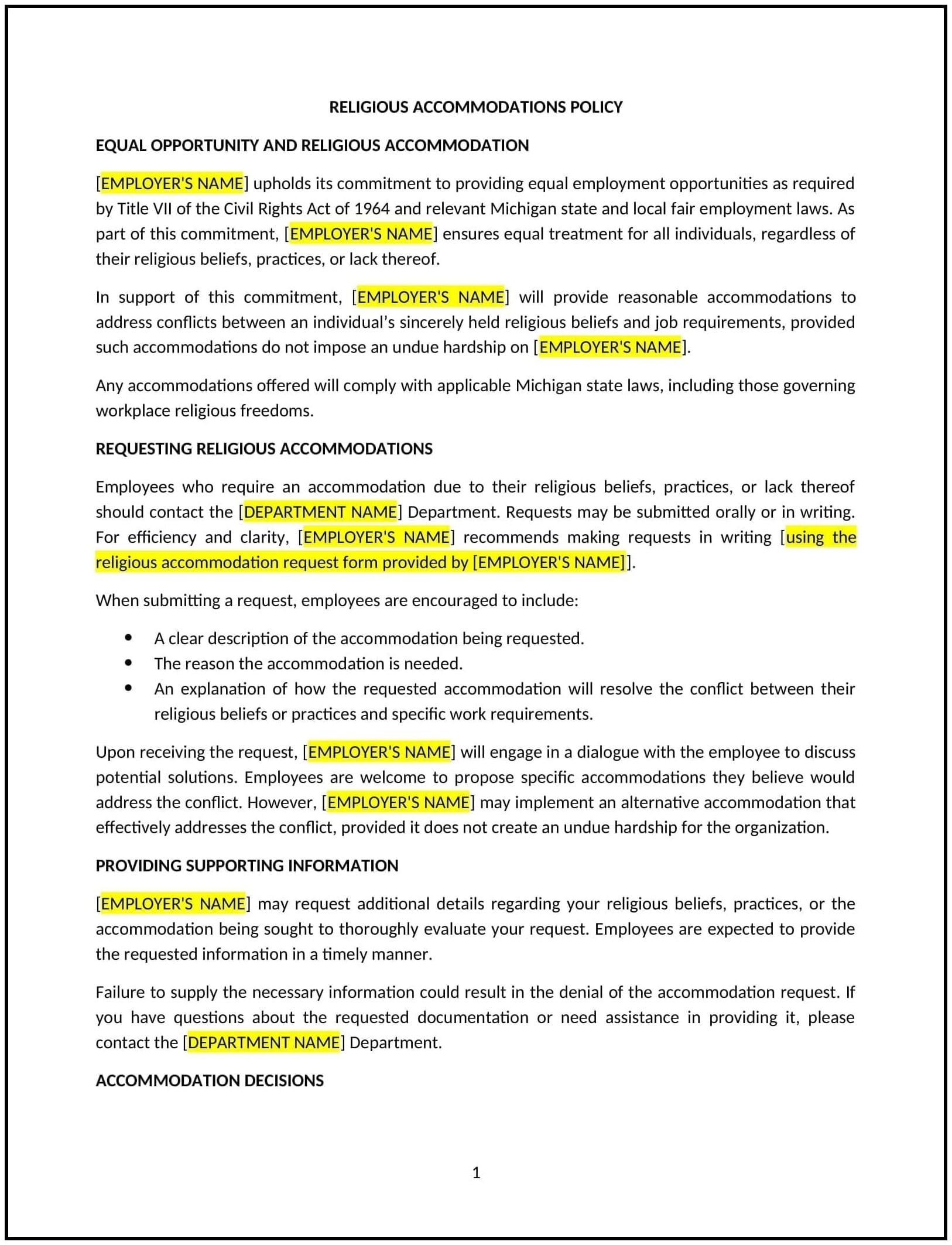Religious accommodations policy (Michigan): Free template
Got contracts to review? While you're here for policies, let Cobrief make contract review effortless—start your free review now.

Customize this template for free
Religious accommodations policy (Michigan)
A religious accommodations policy outlines the process for Michigan businesses to provide reasonable accommodations for employees' religious practices and beliefs in the workplace. The policy defines what constitutes a religious accommodation, the steps for requesting accommodations, and how businesses can meet these requests without causing undue hardship. It ensures that employees can practice their religion freely while balancing the operational needs of the business.
By implementing this policy, businesses can foster an inclusive and respectful workplace, promote diversity, and comply with Michigan state and federal laws regarding religious discrimination and accommodation.
How to use this religious accommodations policy (Michigan)
- Define religious accommodations: Clearly define what constitutes a religious accommodation, such as time off for religious holidays, prayer breaks, or dress code exceptions for religious attire. Be specific about what types of requests are reasonable under the policy.
- Set the process for requesting accommodations: Outline how employees should request religious accommodations, including the timeline for submitting requests, the information required (such as a written request or a discussion with HR), and the proper channels for making these requests.
- Evaluate accommodation requests: Establish how accommodation requests will be evaluated. Businesses should assess each request on a case-by-case basis, considering the employee’s religious needs and how the accommodation can be implemented without causing significant disruption to the business or other employees.
- Provide reasonable accommodations: Identify examples of reasonable accommodations that businesses can offer, such as modifying work schedules, allowing flexible break times for prayer, or providing a private space for religious practices.
- Address undue hardship: Define what constitutes an undue hardship for the business in accommodating religious practices. This may include situations where the accommodation would result in significant financial costs, disruption to business operations, or safety concerns.
- Prevent discrimination: Ensure that employees are not discriminated against based on their religion or religious practices. The policy should make it clear that no employee will be penalized or treated unfairly for requesting or needing a religious accommodation.
- Train managers and HR staff: Provide training for managers and HR personnel on how to handle religious accommodation requests and ensure they are sensitive to religious diversity and compliant with the policy.
- Review and update regularly: Periodically review and update the policy to reflect changes in Michigan state laws, federal regulations, and the business’s operational needs.
Benefits of using this religious accommodations policy (Michigan)
This policy provides several key benefits for Michigan businesses:
- Promotes inclusivity and respect: The policy demonstrates a commitment to creating an inclusive work environment where employees’ religious beliefs are respected, fostering a culture of diversity and mutual respect.
- Reduces legal risks: By complying with Michigan state laws and federal regulations, including Title VII of the Civil Rights Act, businesses reduce the risk of legal claims related to religious discrimination or failure to accommodate employees’ religious practices.
- Enhances employee satisfaction and retention: Offering religious accommodations can improve employee satisfaction, loyalty, and retention by showing that the business values its employees' beliefs and is willing to make reasonable adjustments to support them.
- Encourages diversity: Supporting religious diversity within the workplace can lead to a more diverse and productive team, as employees feel more comfortable and valued in their roles.
- Improves business reputation: A business that fosters inclusivity and respects employees' religious practices enhances its reputation, both among employees and in the broader community.
Tips for using this religious accommodations policy (Michigan)
- Communicate the policy clearly: Ensure all employees are aware of the religious accommodations policy by including it in the employee handbook, during onboarding, and in regular communications about workplace diversity and inclusion.
- Be flexible and open: Encourage managers to be flexible and open to employee requests for religious accommodations, and foster a workplace culture where employees feel comfortable making these requests.
- Document accommodation requests: Keep a record of all religious accommodation requests, including the accommodations provided, any discussions with employees, and the final decision. This documentation can help address potential issues and ensure consistency in accommodating requests.
- Regularly assess accommodation effectiveness: Periodically review the effectiveness of religious accommodations to ensure they are meeting employees' needs while not causing undue hardship to the business.
- Train managers on cultural sensitivity: Provide training for managers on cultural and religious sensitivity to help them understand different religious practices and how to accommodate them appropriately.